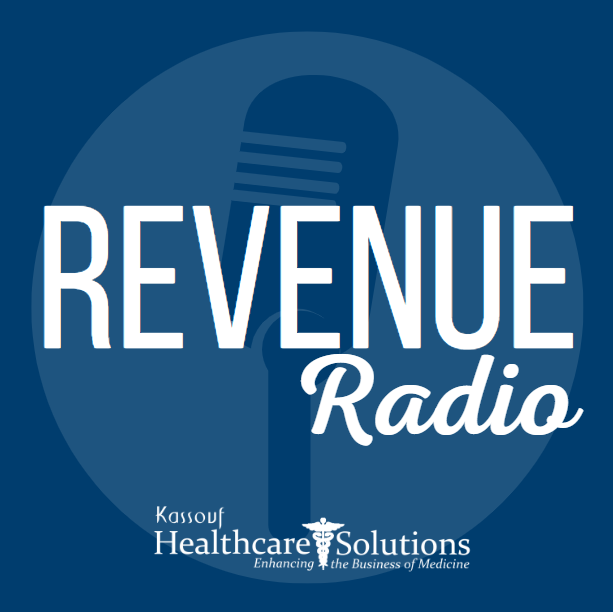Episode Transcript
Speaker 1 00:00:13 This is the Kaso Podcast Network where your trusted advisors are at your fingertips, are in your earbuds. At Kassouf, we are an accounting and advisory firm made up of a team of specialists in a variety of fields, from healthcare consulting to cybersecurity, to everything in between Here, you'll discover tips to make your business rent better from interviews with our subject matter experts. I'm your host, Tara Arrington. As an ex-journalist turn marketing professional, I'm the non-expert who will chat with our experts delving into the information you need to help your business succeed. Today's episode of the Kause Podcast Network is an excerpt from our recent webinar about the public health emergency expiration. As you may know, the p e will officially expire May 11th, 2023. This expiration will affect some of the provisions that have been in place since the p h E was started today. Senior Healthcare Advisor, Stewart Garner, will discuss the changes that will affect telehealth when the p h e expires.
Speaker 2 00:01:24 I do wanna start with a couple of comments before we dive into this telehealth overview. It's, it's obviously a big box, uh, this Pandora's box, so to speak, that we opened with telehealth specifically. So I, I'll do my best to cover some, some what I think are, are critical updates, um, and try to stick to a very straightforward what's expiring, what's extended, and kind of when those things are ending. That being said, if we don't cover something today, I know we've mentioned this a few times, but, uh, please ask questions in the chat, uh, the q and a rather. We'll, we'll try to get to those at the end. If you're uncomfortable asking a question for some reason, by all means email us. And if we can't get a clear answer today, we'll do our best to get you one, uh, as soon as possible.
Speaker 2 00:02:07 And then secondly, before we advance the next slide, my updates are, are at the federal level. I do wanna make sure I say that in case I forget later on in the slides. There are some cases where states have exceptions or other regulatory considerations you need to be mindful of. Please make sure you're checking for any state specific, um, considerations you guys need to be mindful of. Uh, next slide. All right, so we're gonna start with what is, um, extended, so not expiring at the end of, um, the pH e in May, and you can advance to the next slide. Uh, Jonie, actually two slides. So on the 31st of, uh, next year, uh, the following are some of the expirations that I thought were worth noting. So the first being the originating site and geographic locations. So during the pH e patients could essentially be seen anywhere, um, at home, for example, they weren't required to and aren't required for the time being to travel to a qualifying originating site and meet those geographic location requirements that they were subject to before.
Speaker 2 00:03:16 Uh, this flexibility was issued, but after December 31st of next year, that all reverts back to what it was, and patients will have to be seen from a, uh, a qualifying site. As far as the providers that were, uh, granted the ability to treat patients, uh, that was, uh, expanded to include several therapists, occupational, uh, physical speech language, audiologists as well. And of course, that's going away as of now. Anyway, that's probably a key disclaimer as well. As of now, that sets expire at the end of next year. Uh, also at this point, there are no audio-only services that Medicare is planning to reimburse after the end of next year. I think, uh, several of note that they have paid for to date, uh, includes several evaluation and management services, certain, uh, annual wellness visits, for example. I think many of us, uh, or many of you rather, took advantage of that opportunity that is going away.
Speaker 2 00:04:14 You wanna make sure you plan for that. And then lastly, the FQHCs and RHCs on the call. You were finally brought to the, um, I'll call it the cool kids table, if you will, and were able to serve as that distant site. Uh, that is no longer, uh, going to be the case. You won't be able to be paid for those in bill for those services. Um, next slide please. As far as, uh, what is expiring, uh, more of a start planning yesterday mentality, if you'll advance Joni, um, these are set to expire at the end of the PhD. Uh, the first one is very, very important. Uh, the very platform we're on now is a good example of what, uh, the officer of civil Rights allowed practices to use in good faith for telehealth. Um, even if it wasn't HIPAA compliance. So the FaceTimes, the Skypes, the Zooms that I mentioned, all that is going away.
Speaker 2 00:05:07 Um, and I, I do think it's worth pointing out if you're not aware, or rather maybe if you are aware, some of those companies have come out with what they feel are HIPAA compliant versions of these platforms. Teams, uh, Skype for Business, I think zoom, zoom for healthcare, I think is another, uh, they've even gone as far as to say that they would sign a baa uh, business associate agreement. So you certainly wanna make sure you do your due diligence regardless of you're going with a platform like that, or if your EMR has created some sort of HIPAA compliant platform when they claim to be. So anyway, make sure you are, you're doing your due diligence and you have those BAAs executed before, uh, the end of the PhD in May. I also thought it, it was worth noting in case, in case we've forgotten for the audio only services that are covered through the end of next year, if you are using just a regular old fashioned, uh, landline, the OCR does not consider that to be electronic phi.
Speaker 2 00:06:08 But if you're using a, uh, voice, um, over IP or any sort of app that requires internet or wifi, even if it's audio only, they're gonna consider that electronic vhi at that point. So you're gonna be very mindful of what you're using, even if it's not face to face or rather, uh, video enabled technology. Make sure that you are doing your due diligence again, and that all of the, uh, proper measures are in place. Secondly, another big one, uh, I think we saw a lot with our clients anyway, is, is the, the blurring of state lines, so to speak, that allowed providers with equi equivalent, excuse me, licenses in other states to see patients across state lines. That's going away. This is, uh, especially state specific, if that's even that even makes sense. But I wanted to make sure I, I pointed that out with this one in particular, because I know across several states in the southeast there, there are different flexibilities and different viewpoints, if you will.
Speaker 2 00:07:04 Some have already expired and some have actually enacted more permanent flexibilities. You can refer to the Federation of State Medical Boards. There's a good summary of policies by state out there. I can't guarantee how often they update it, but if anyone is interested in that link, I do have that link. I'd be happy to share. It's got, like I said, a pretty good, um, summary of those state specific licensure kind of requirements there. And lastly, for those that are, are prescribing controlled substances prior to, uh, the public health emergency, a face-to-face visit was an in-person visit was required. Uh, and that was relaxed during the, uh, public health emergency when certain requirements were met. And that is no longer going to be the case. Uh, next slide please. Now, these, I, I put an asterisk intentionally because technically they are ending or expiring, if that's a the right way to say it, May 11th, but we have until the end of the year, or they will, they will go on through the end of the year.
Speaker 2 00:08:04 So it's another, another confusing thing in, in what is already very confusing situation, but the first being the relaxation of home address reporting for providers who are seeing patients, uh, via telehealth. So once, uh, the, the end of the year of this year has, has reached us, you will have, you will have been expected to add all of your provider home addresses to the existing enrollment record on peco. So if you plan to continue allowing your providers to see patients via telehealth from home, you wanna make sure that you're updating the enrollment records with Medicare on their PECO system to reflect those addresses. Now, I've, I've had a couple folks ask me about this process. We, I do a lot of work with credentialing here, and Medicare has, has expressed, um, the intention to make changes to applications. I know they're rolling out a new form or a platform rather for Pecos, uh, but specifically with the applications, they are, are trying to make it a little clearer and easier to indicate that this address you are adding is not to be shared publicly, uh, because it's not required to, to be shared through the physician compare database.
Speaker 2 00:09:09 So I, I would suspect that, uh, they'll come out with some of that clarification here in the next few weeks because I know several groups and a lot of providers out there are looking to add those addresses. So be on the lookout for some of those updates. But you do technically have until the end of the year to make all of those changes. Uh, and the second one, that's a big one, is the payment parody. So for the duration of the public health emergency, we've been fortunate enough to be paid, or you rather have been fortunate enough to be paid equal rates for an in-person visit with the, uh, telehealth services that Medicare approved, uh, that is, is going away. So the Medicare physician preschedule rule actually extended this through the end of the year. So the 150 second day after the public health emergency, we should continue to report the same place of service indicator you guys have been reporting this whole time as if the visit was performed in person.
Speaker 2 00:10:04 So if you work for an outpatient clinic, it should be place of service 11. That should continue all the way through the end of the year. But on that 150 second day, you do not have to report that modifier 95 any longer to cms. Uh, and starting January 1st of next year, all the, uh, place of service indicators should refer back to what they should be, and the payment rate should be reduced barring someone unforeseen changes with the, uh, next year, some Medicare physician fee schedule rule. Uh, next slide please. So, and you can advance one more for me, Joanie. The, we had a couple of questions in the pre-registration about the CPT specific changes, what's expiring, what's been extended. And I, I'll be honest, uh, this telehealth and all these relaxations and and extensions are, like I said, very confusing, but I did feel a little better about, uh, what seems to be some confusion from cms.
Speaker 2 00:10:59 Uh, and if the folks who are, are kind of more in charge, if you will, of some of these, these relaxations and extensions don't seem to have some sort of consolidated resource and actually have some, uh, almost conflicting resources out there for the public to, to use and have access to. It makes me feel a little better anyway. So maybe somebody out there funds a little more comfort in that as well. But I did put, uh, a couple of images here, and on the next slide in a second, you'll see the links of these two resources. They're both great resources. I don't mean to suggest they're not reliable, but what, what you need to do is you need to make sure you use both together. Uh, the first is, uh, an Excel spreadsheet for all of my, my other, uh, Excel kind of geeks out there.
Speaker 2 00:11:40 Like me, I, I love a good spreadsheet. It has lists of codes, descriptions if you're permitted to perform them via audio only and if there are any sort of payment limitations. So we've got all sorts of good things on there. Evaluation management codes, uh, outpatient settings, nursing facility settings, annual wellness visit codes, so on and so forth. And it's, it's really easy to kind of filter and, and search through. Whereas the second image below is from a PDF fax sheet, uh, that Medicare actually updated two weeks after the spreadsheet. So the first resource was last updated February 13th. And this pdf, uh, fact sheet many of you probably have was last updated on February 24th. And when I started comparing the two, I realized that there were additional codes listed on the pdf, uh, that were not listed on the spreadsheet. So that's when I started realizing that, uh, you want to use both. And if you like the format of the spreadsheet and you don't see a code there that you think may be extended, I would double check the PDF to see if there's language there that suggests, uh, that was just overlooked or missed when that spreadsheet was created.
Speaker 1 00:12:50 Thank you for tuning in to the kaso podcast Network. Resources for today's episode are linked in the episode notes. Thank you to our producer Russ Dorsey and for Kassouf for powering this podcast. Be sure to stay up to date on new episodes and more information about today's episode by following at kassouf Co. Until next time, thanks for tuning in.


